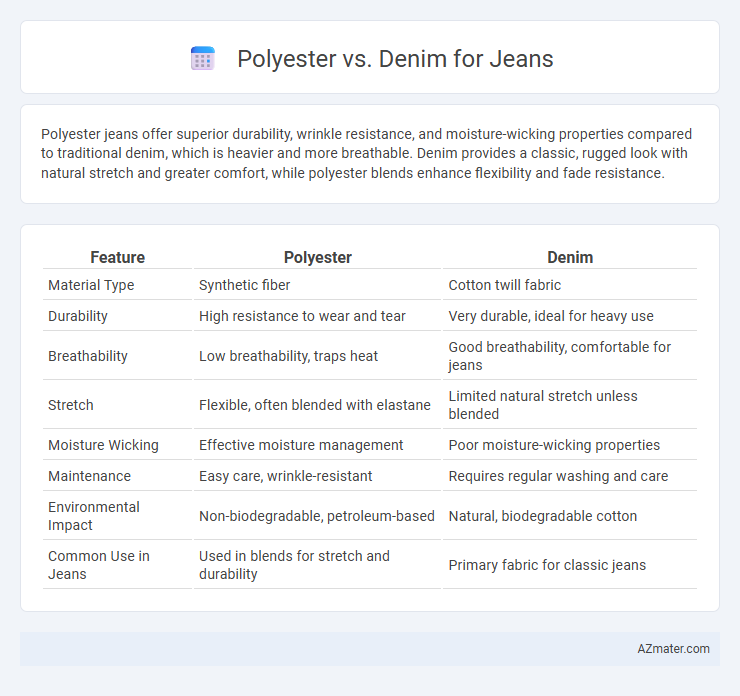Polyester jeans offer superior durability, wrinkle resistance, and moisture-wicking properties compared to traditional denim, which is heavier and more breathable. Denim provides a classic, rugged look with natural stretch and greater comfort, while polyester blends enhance flexibility and fade resistance.
Table of Comparison
| Feature | Polyester | Denim |
|---|---|---|
| Material Type | Synthetic fiber | Cotton twill fabric |
| Durability | High resistance to wear and tear | Very durable, ideal for heavy use |
| Breathability | Low breathability, traps heat | Good breathability, comfortable for jeans |
| Stretch | Flexible, often blended with elastane | Limited natural stretch unless blended |
| Moisture Wicking | Effective moisture management | Poor moisture-wicking properties |
| Maintenance | Easy care, wrinkle-resistant | Requires regular washing and care |
| Environmental Impact | Non-biodegradable, petroleum-based | Natural, biodegradable cotton |
| Common Use in Jeans | Used in blends for stretch and durability | Primary fabric for classic jeans |
Introduction to Polyester and Denim Jeans
Polyester jeans, made from synthetic fibers, offer enhanced durability, wrinkle resistance, and moisture-wicking properties, making them ideal for active wear. Denim jeans, woven from cotton fibers, provide timeless style, breathability, and a natural texture favored for everyday comfort. The choice between polyester and denim jeans depends on factors like desired fabric performance, aesthetic preference, and intended use.
Fabric Composition: Polyester vs Denim
Polyester jeans consist mainly of synthetic fibers known for durability and wrinkle resistance, offering lightweight and moisture-wicking properties. Denim fabric is traditionally made from 100% cotton woven in a twill pattern, providing breathability, softness, and rugged texture. Blends of polyester and cotton in denim enhance stretch, strength, and quick-drying capabilities, balancing comfort with performance.
Comfort and Wearability
Polyester blends in jeans enhance elasticity and moisture-wicking properties, providing superior comfort for extended wear and active movement. Denim, traditionally made from 100% cotton, offers breathability and durability but can feel stiffer and less flexible compared to polyester-infused fabrics. Combining polyester with denim creates jeans that balance ruggedness with softness, improving overall wearability without sacrificing classic style.
Durability and Longevity
Polyester-infused jeans offer enhanced durability due to their resistance to abrasion, stretching, and shrinking, making them less prone to wear and tear compared to traditional denim. Denim, primarily composed of cotton, provides substantial strength but can fade and weaken over extended use or frequent washing. Blended fabrics combining polyester and denim fibers optimize longevity by maintaining structural integrity while preserving the classic denim appearance.
Style and Aesthetics Comparison
Polyester jeans offer a sleek, smooth finish with vibrant color retention, making them ideal for modern, fashion-forward styles. Denim boasts a classic, textured look with natural fading and distressing that enhances its timeless, rugged aesthetic. The distinct visual appeal of polyester contrasts sharply with denim's traditional, durable charm, catering to different style preferences and aesthetics.
Stretch and Flexibility
Polyester-infused jeans offer superior stretch and flexibility compared to traditional denim due to the synthetic fibers' elasticity. Denim, primarily made from cotton, provides durability and a rigid structure but lacks the same level of stretch without blending with materials like spandex or polyester. Jeans incorporating polyester blends enhance comfort and mobility, making them ideal for active wear or extended daily use.
Breathability and Climate Suitability
Polyester jeans offer low breathability due to their synthetic fibers, making them less ideal for hot and humid climates where moisture-wicking is essential. Denim, typically made from cotton, provides superior breathability and comfort, allowing air circulation that helps regulate body temperature in warm weather. For cold climates, polyester blends can provide additional insulation, while denim ensures durability and moderate warmth.
Ease of Care and Maintenance
Polyester jeans offer superior ease of care and maintenance due to their wrinkle-resistant and quick-drying properties, requiring minimal ironing and fewer washes. Denim, typically made from cotton, demands more frequent washing and careful handling to prevent fading and maintain fabric integrity. Choosing polyester blends can significantly reduce upkeep time while preserving the jeans' appearance and durability.
Environmental Impact and Sustainability
Polyester jeans contribute significantly to microplastic pollution as synthetic fibers shed during washing, while denim, primarily made from cotton, requires extensive water and pesticide use posing environmental challenges. Organic cotton denim reduces chemical inputs and water consumption, improving sustainability compared to conventional cotton; however, polyester recycled from PET bottles lowers reliance on virgin fossil fuels. Sustainable practices in both materials focus on reducing water use, chemical treatments, and incorporating recycled content to mitigate their overall environmental impact in jean production.
Choosing the Right Fabric: Polyester or Denim for Jeans
When choosing between polyester and denim for jeans, consider durability, comfort, and appearance; denim offers a classic, breathable cotton feel with excellent longevity, while polyester provides wrinkle resistance, stretch, and moisture-wicking properties. Denim is ideal for traditional, rugged styles and long-lasting wear, whereas polyester blends enhance flexibility and quick-drying performance, making them suitable for active or fashion-forward jeans. Evaluate lifestyle needs and personal preferences to select the best fabric that balances comfort, style, and functionality in jeans.

Infographic: Polyester vs Denim for Jeans
 azmater.com
azmater.com